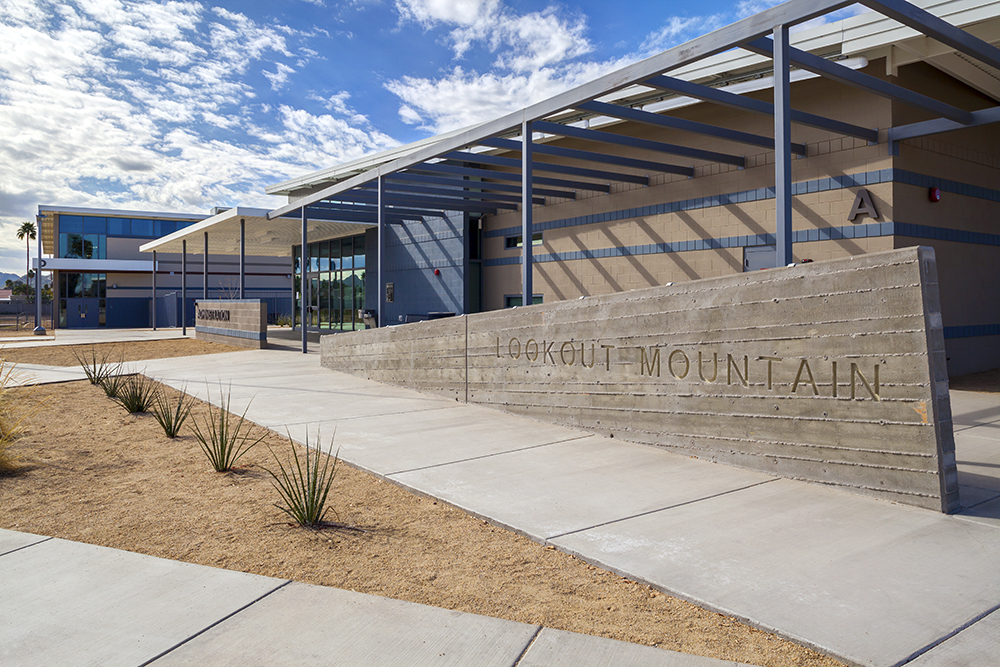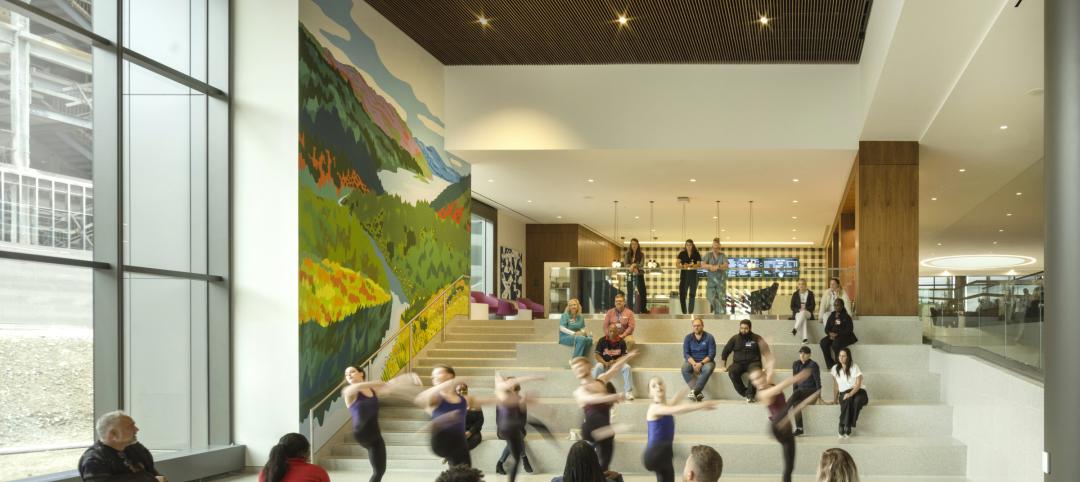“UAV.” “LATISTA.” “CMST.” If BD+C Giants 300 contractors have anything to say about it, these new terms may someday be as well known as “BIM” or “LEED.” Here’s a sampling of what Giant GCs and CMs are doing by way of technological and managerial innovation.
Hoar Construction is using UAVs—$1,200 unmanned aerial vehicles—to replace aerial photography and video on job sites. C.W. Driver is using its new Quad-copter drone to record building conditions and capture live video for inspection purposes. The firm is also using Structure Scanner to take millions of measurements of field conditions and compile the data into point-cloud files for modeling purposes.
In the BIM/VDC arena, Bernards claims that its use of BIM and Lean construction principles has led to a “dramatic reduction” in RFIs and change orders. HITT Contracting says it can now provide virtual O+M services via BIM to help clients improve ongoing building maintenance. Adolfson & Peterson Construction employs BIM on a fourth of its projects, largely for above-ceiling coordination of MEP/FP systems, but expects to deploy BIM more frequently in the future as projects grow in size and complexity.
TOP CONTRACTORS
2013 Contractor Revenue ($)
1 Turner Construction $9,979,430,000
2 Whiting-Turner Contracting Co., The 4,945,423,597
3 Skanska USA 4,866,277,915
4 PCL Construction 4,120,167,281
5 Gilbane 4,018,478,800
6 Balfour Beatty US 3,809,444,142
7 Clark Group 3,602,639,993
8 Fluor Corporation 3,396,120,000
9 Structure Tone 3,152,076,000
10 Lend Lease 2,707,076,000
SEE FULL LIST
TOP CONSTRUCTION MANAGEMENT FIRMS
2013 CM+PM Revenue ($)
1 Jacobs $1,663,220,000
2 Barton Malow 473,626,515
3 Hill International 383,000,000
4 URS Corp. 267,251,113
5 Harkins Builders 189,000,000
6 JE Dunn Construction 175,307,980
7 STV 168,215,000
8 Parsons Brinckerhoff 159,724,478
9 Turner Construction 140,640,000
10 JLL 125,969,026
SEE FULL LIST
Off-the-shelf apps are proving popular with GCs. Paric Corp. and PCL Construction have found Autodesk’s BIM 360 Field useful in providing project content in the field via iPads, laptops, and smartphones. (PCL also uses BIM 360 Glue.) PlanGrid, which S. M. Wilson implemented this year, gives team members—including designers, owners, and subcontractors—instanteous access to construction documents, specifications, punch lists, photos, notes, and RFIs.
Giants 300 coverage of Construction Firms brought to you by Armstrong www.armstrong.com/fastshipclips
Messer Construction has been using LATISTA management software on 80% of its projects in the past year to perform field-based quality control in support of its Lean Daily Management program. LPCiminelli has set up its own customer enterprise system, BRICKS, to drive down costs.
Prefabrication is also grabbing contractors’ attention. Walbridge built 125 complete bathroom units off site for a renovation at the University of Michigan and is building another 750 bath units for a new residence hall at Michigan.
DPR Construction has partnered with OES Supply Company on the development of a “temporary dust containment system” that replaces temporary gypsum board walls. Ten linear feet of the containment barrier can be installed in 10 minutes. Over a three-month period, using 20 linear feet of the anti-dust barrier could save 50% over drywall, says DPR.
Technical innovation is evident at Columbia University’s massive $6.8 billion Manhattanville expansion in West Harlem, where Lend Lease constructed a gigantic slurry wall around the 17-acre plot—“a huge geotechnical accomplishment,” according to Lend Lease. For the Jerome L. Greene Science Center, the contractor is using “top-down” construction, in which work proceeds in both vertical directions simultaneously—a first for the Big Apple, says Lend Lease.
CONTRACTOR INVENTIVENESS NOT LIMITED TO TECH
Contractors are also making headway with management innovations. Summit Contracting now limits its project managers to a single job at a time so that they can devote their undivided attention to that one owner’s project.
Materials delivered to Hoffman Construction sites are used within three workdays; excess items are immediately stored in wheeled, covered receptacles to keep work sites safe.
KBE Building Corp. has implemented a disaster recovery system. All data stored in the firm’s main server in Farmington, Conn., is automatically copied to a backup server in Columbia, Md., reducing recovery time in the event of a disaster to two hours, rather than three days.
Firms are widening their horizons, too. DLR Group has created a Building Optimization Group to provide commissioning, retro Cx, energy modeling, and building analysis services. Shawmut Design and Construction reached out to recent college graduates with its Construction Management Skills Training (CMST) program, a three-year rotation through the firm’s project management, estimating, and field divisions—and got 2,000 applications for 30 positions.
Market perspective: Hill International’s David Richter
“We’re still climbing out of the recession, although the industry’s certainly in a growth mode,” says David L. Richter, President/COO of Hill International, Marlton, N.J. Richter’s father, Irvin, founded the company in 1976 to provide claims consulting, which still constitutes 25% of revenues. Hill, which went public in 2006 (NYSE: HIL), has grown into one of the biggest project management firms in the world, with 4,200 employees in more than 100 offices managing more than 1,000 projects.
Eighty percent of its business is outside the U.S.—half of that in fast-paced non-buildings sectors like transportation and energy—putting the construction management firm on a steeply upward path, says Richter, a BD+C “40 Under 40” superstar (Class of 2006). He will step up to the CEO role in January; his father will stay on as Chairman.
In recent years, the Richters have moved the business in the direction of program management—clients who have multiple massive projects going on at any one time. “Developers in places like the Middle East rarely put up one building,” says Richter. “It’s four, five, six or more at a time, and you can really drive down costs when you have that kind of scale.”
The company is currently managing 40 programs in the billion-dollar range. Current projects include new airport terminals in Abu Dhabi ($2.93 billion), Bahrain ($950 million), and Muscat, Oman ($5.2 billion).
In the U.S., most of Hill’s vertical portfolio is on the East Coast, primarily in higher education and healthcare. Last December, the firm acquired 20-person Collaborative Partners, a Boston firm with strong ties to the New England K-12, healthcare, and biosciences sectors. “That deal has already started to pay off for us, with work at UMass Boston and Northeastern University’s Interdisciplinary Science and Engineering Complex,” says Richter.
Read BD+C's full 2014 Giants 300 Report
Related Stories
Architects | Feb 27, 2023
Hord Coplan Macht announces retirement of Founder/CEO Lee Coplan, FAIA, and names successor
Hord Coplan Macht, an award-winning integrated architecture, interior design, landscape architecture, and planning firm, announces the retirement of Founder and Chief Executive Officer Lee Coplan, FAIA. Lee leaves behind a long and celebrated career leading the practice over the last four decades while bringing innovative design strategies and leadership to the architecture and design community.
Libraries | Feb 26, 2023
A $17 million public library in California replaces one that was damaged in a 2010 earthquake
California’s El Centro community, about two hours east of San Diego, recently opened a new $17 million public library. With design by Ferguson Pape Baldwin Architects and engineering services by Latitude 33 Planning & Engineering, the 19,811-sf building replaces the previous library, which was built in the early 1900s, damaged by a 7.2 earthquake that struck Baja California in 2010, and demolished in 2016.
Architects | Feb 24, 2023
7 takeaways from HKS’s yearlong study on brain health in the workplace
Managing distractions, avoiding multitasking, and cognitive training are key to staff wellbeing and productivity, according to a yearlong study of HKS employees in partnership with the University of Texas at Dallas’ Center for BrainHealth.
University Buildings | Feb 23, 2023
Johns Hopkins shares design for new medical campus building named in honor of Henrietta Lacks
In November, Johns Hopkins University and Johns Hopkins Medicine shared the initial design plans for a campus building project named in honor of Henrietta Lacks, the Baltimore County woman whose cells have advanced medicine around the world. Diagnosed with cervical cancer, Lacks, an African-American mother of five, sought treatment at the Johns Hopkins Hospital in the early 1950s. Named HeLa cells, the cell line that began with Lacks has contributed to numerous medical breakthroughs.
Arenas | Feb 23, 2023
Using data to design the sports venue of the future
Former video game developer Abe Stein and HOK's Bill Johnson discuss how to use data to design stadiums and arenas that keep fans engaged and eager to return.
Museums | Feb 22, 2023
David Chipperfield's 'subterranean' design wins competition for National Archaeological Museum in Athens
Berlin-based David Chipperfield Architects was selected as the winner of the design competition for the new National Archaeological Museum in Athens. The project will modernize and expand the original neoclassical museum designed by Ludwig Lange and Ernst Ziller (1866-1874) with new spaces that follow the existing topography of the site. It will add approximately 20,000 sm of space to the existing museum, as well as a rooftop park that will be open to the public.
Multifamily Housing | Feb 21, 2023
Watch: DBA Architects' Bryan Moore talks micro communities and the benefits of walkable neighborhoods
What is a micro-community? Where are they most prevalent? What’s the future for micro communities? These questions (and more) addressed by Bryan Moore, President and CEO of DBA Architects.
Healthcare Facilities | Feb 21, 2023
Cleveland's Glick Center hospital anchors neighborhood revitalization
The newly opened MetroHealth Glick Center in Cleveland, a replacement acute care hospital for MetroHealth, is the centerpiece of a neighborhood revitalization. The eleven-story structure is located within a ‘hospital-in-a-park’ setting that will provide a bucolic space to the community where public green space is lacking. It will connect patients, visitors, and staff to the emotional and physical benefits of nature.
Multifamily Housing | Feb 21, 2023
Multifamily housing investors favoring properties in the Sun Belt
Multifamily housing investors are gravitating toward Sun Belt markets with strong job and population growth, according to new research from Yardi Matrix. Despite a sharp second-half slowdown, last year’s nationwide $187 billion transaction volume was the second-highest annual total ever.
Multifamily Housing | Feb 21, 2023
New multifamily housing and mixed-use buildings in Portland, Ore., must be ready for electric vehicle charging
The Portland, Ore., City Council recently voted unanimously to require all new residential and mixed-use buildings to be ready for electric vehicle charging. The move amends Portland’s zoning laws to require all new multi-dwelling and mixed-use development of five or more units with onsite parking to provide electric vehicle charging infrastructure.


















